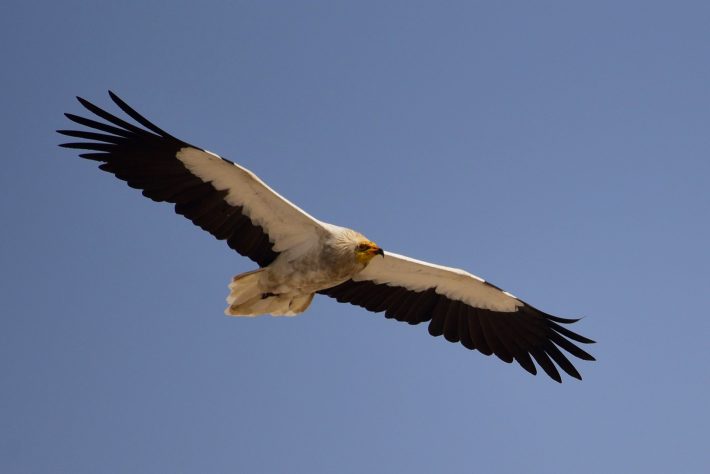Captive breeding programme essential for vultures’ survival
A new study, published in Journal of Applied Ecology, shows that supporting a declining population of the Egyptian vulture with captive-reared young birds every year could delay extinction. However, further work is required to remove threats and ultimately guarantee its survival.

The results of this work show that as long as there is a lot of human-induced mortality along the flyway and no improvement in survival, releasing even up to 15 captive-reared birds every year would not be sufficient to maintain the Balkan breeding population.
However, this approach would buy the conservationists some time to remove threats along the flyway, because the extinction risk in 30 years was markedly lower with than without population reinforcement. That time could then be used to increase survival of birds in the wild by about 6%, which would be sufficient for the population to be self-sustainable without the need for further captive releases.
Steffen Oppel, RSPB’s Senior Conservation Scientist and lead author of the study said: “Predicting the future trend of a population is always very difficult, and there is a lot of uncertainty in our predictions. But despite this uncertainty, we can be quite confident that unless we reduce the survival of wild birds along the flyway our hope of maintaining the Balkan population would be very slim – regardless of the fantastic efforts to raise birds in captivity.”
The Egyptian vulture is a large bird of prey found through most of southern Europe, however numbers have declined by more than 50% since the 1990s. Vultures provide the vital service of removing rotting carcasses from the landscape. Whether dead cattle, elephants or antelopes – vultures ensure that these carcasses are cleaned up free of charge. The catastrophic decline of vultures in India led to an overabundance of feral dogs and increased rabies infections in people.
Unless we reduce the survival of wild birds along the flyway our hope of maintaining the Balkan population would be very slim.
Egyptian Vultures breeding in eastern Europe migrate around 5000 km twice a year between breeding and wintering regions. These journeys are hazardous, and many birds die from human and natural threats along the way, such as direct persecution, inadvertent poisoning, or electrocution and collision with power infrastructure.
This study comes hot on the heels after another paper published last week in the journal Bird Conservation International which identified electrocution from poorly-designed powerlines as a serious threat for Egyptian vultures. In this paper, scientists called for funders and Governments to invest in infrastructure which eliminates the electrocution risk to large birds.
Many migratory species are threatened, and their conservation is often tricky, because it requires the collaboration of many countries. But there is some hope for the Egyptian Vulture population on the Balkans. Work is progressing in many countries to reduce wildlife poisoning, refurbish dangerous power infrastructure to reduce accidental deaths from collision and electrocution, and to reduce the direct persecution of vultures.
Many more years of monitoring will be needed to show whether these efforts along the entire flyway actually lead to the required improvement in survival. But in the meantime, the release of 4-6 captive-reared young birds every year will afford conservationists some time to tackle the Herculean task of reducing threats across the three continents that Egyptian Vultures cross twice per year on their annual migrations.
You can read the full article for free (for a limited time) here:
Oppel, S., Saravia, V., Bounas, A., Arkumarev, V., Kret, E., Dobrev, V., Dobrev, D., Kordopatis, P., Skartsi, T., Velevski, M., Petrovski, N., Bino, T., Topi, M., Klisurov, I., Stoychev, S., Nikolov, S., 2021. Population reinforcement and demographic changes needed to stabilise the population of a migratory vulture. Journal of Applied Ecology
Media contact:
Vanessa Amaral-Rogers, Vanessa.amaralrogers@rspb.org.uk. 07506 144901
Like what we stand for?
Support our mission and help develop the next generation of ecologists by donating to the British Ecological Society.